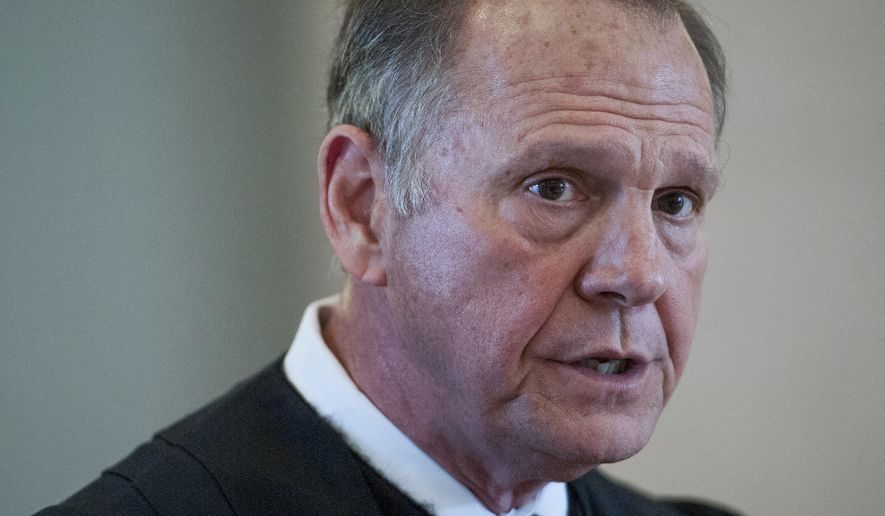MONTGOMERY, Ala. (AP) - Alabama Chief Justice Roy Moore on Wednesday insisted to members of a judiciary commission that he never urged probate judges to defy a U.S. Supreme Court ruling legalizing gay marriage, defending himself from charges brought by a state ethics panel.
Testifying under oath, Moore called the accusations of him abusing his position “ridiculous.”
The ethics case involves an administrative order Moore sent six months after the U.S. Supreme Court ruled that gays can marry in every U.S. state. Moore said then that because the Alabama Supreme Court had not rescinded an order instructing judges to refuse marriage licenses to gay couples, the state’s probate judges remained bound by it.
The outspoken Republican jurist, now 69, was removed from office in 2003 for violating judicial ethics by refusing to remove a Ten Commandments statue, but voters later re-elected him.
The current proceeding against Moore, before the nine-member Court of the Judiciary, could end with his removal from office once again.
“We are here 13 years later because the Chief Justice learned nothing from that first removal. He continues to defy the law,” said John Carroll, a lawyer representing the Judicial Inquiry Commission, which brought the ethics charges against Moore.
Moore likened his order to a status report. He said he correctly noted that the Alabama Supreme Court hadn’t yet ruled on what to do with the March order in the wake of the U.S. Supreme Court decision.
“It would be against the principles that I hold dear to tell anyone to defy a court order,” Moore testified.
Another lawyer for the commission, R. Ashby Pate, countered that by the time Moore wrote the administrative order, the legal debate over gay marriage was over. The U.S. Supreme Court had ruled in Obergefell v. Hodges that came-sex couples could marry in all 50 states and a federal judge had enjoined probate judges from enforcing Alabama’s same-sex marriage ban, he said.
“His order sowed confusion. It did not clear it up. He urged defiance, not compliance,” Pate said.
Moorre’s attorney, Mat Staver, argued that even after the U.S. Supreme Court ruling, there still existed conflicting orders from different courts that the Alabama Supreme Court had to consider.
“Obergefell didn’t turn on a light switch and cause all these things to happen like dominoes falling,” Staver said.
The Court of the Judiciary now has 10 days to rule. A decision to remove him from the bench must be unanimous.
Moore’s ethics trial comes during a season of political upheaval in Alabama. The speaker of the state House of Representative was removed from office this summer for criminal ethics violations, and a legislative committee will decide if evidence supports impeaching Gov. Robert Bentley following accusations that he had an affair with a top staffer.
Demonstrators for and against Moore rallied and occasionally tried to outshout each other after the hearing Wednesday. Rainbow flags decorated one side of the courthouse steps while Moore’s supporters blared Christian music and waved “Judge Moore is Right” signs on the other.
“The truth is homosexuality is wrong,” said Donna Holman, who traveled 12 hours from Iowa to support Moore.
Kim McKeand and Cari Searcy, the lesbian couple whose lawsuit led to a federal judge declaring Alabama’s gay marriage ban unconstitutional, said Moore seemed to be on a personal mission to block marriage equality.
“Something happened that I didn’t expect. There was a tide of love that rolled through Alabama and people were standing up and saying, no. This is my state too,” Searcy said.




Please read our comment policy before commenting.